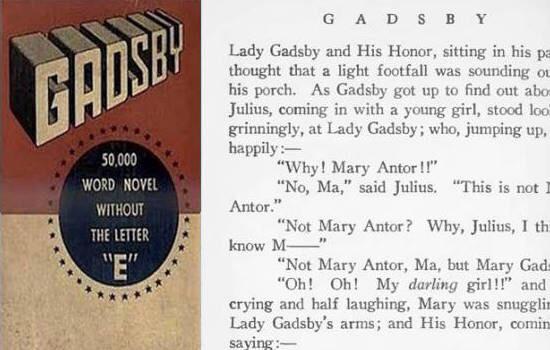We played SCRABBLE last night. By some fluke, Padma came up with the high-scoring sequence MARRIAGE. I told her that MARRIAGE was not a word but a sentence. That was the end of our game, perhaps for a long time.
Alone and still hunched over the board, I did a bit more checking. Did you know that the English-language editions of Scrabble contains 100 letter tiles, in the following distribution: 2 blank tiles (scoring 0 points) 1 point: E ×12, A ×9, I ×9, O ×8, N ×6, R ×6, T ×6, L ×4, S ×4, U ×4 ? It confirms, kind of, that the most used - and most useful - letters in our alphabet are e, t, a, i, s, o, n, h, and r, in that order.
With e being the most used letter in our alphabet, could you image someone writing a book, all 112 pages of it, purposely avoiding all words containing the vowel e ? What immediately comes to mind is how to write the past tense of verbs, almost all of which end with "—ed." Therefore substitutes must be found; and they are very few. This will cause, at times, a somewhat monotonous use of such words as "said;" for neither "replied," "answered" nor "asked" can be used. The numerals also cause plenty of trouble, for none between six and thirty are available. Pronouns also caused trouble; for such words as he, she, they, them, theirs, her, herself, myself, himself, yourself, etc., could not be used.
And yet, Ernest Vincent Wright, an American writer, wrote the 50,000-word novel "Gadsby" which, except for the introduction and a note at the end, did not use the letter e, the most common letter in English. Check it our here.
Something that deliberately avoids certain letters is called a lipogram (not to be confused with liposuction which you might be familiar with).
